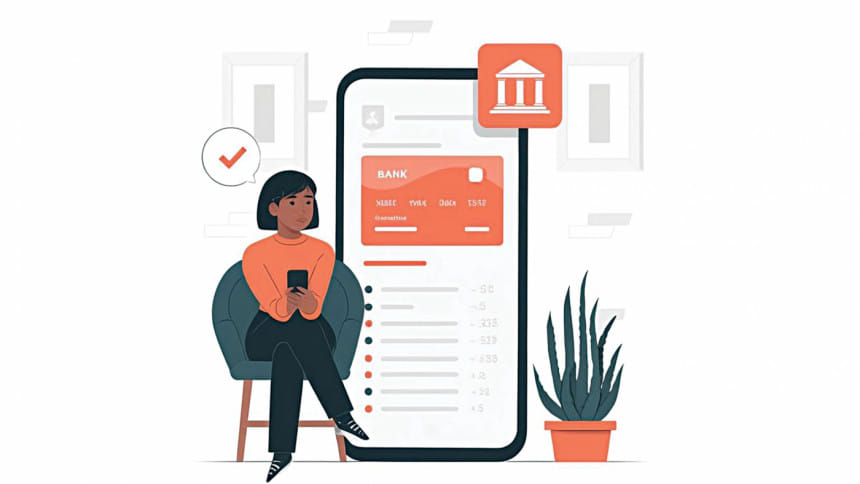Anchoring financial growth

Offshore banking is considered a timely measure to support Bangladesh's economy by addressing the ongoing dollar crisis, which is affecting numerous trade and industrial activities. In addition to export earnings and remittances, this banking segment has already contributed to the dollar supply. Increasing deposits from foreign sources and boosting investments through offshore banking holds significant potential to help stabilize the economy.
Defining Offshore Banking
Any financial activity occurring outside someone's home country is offshore banking. The features involve allowing individuals and businesses to benefit from having accounts and engaging in financial transactions, potential tax benefits, and a relatively lenient regulatory setting for international transactions
In the context of Bangladesh, offshore banking denotes banking activities conducted in foreign currencies obtained by Bangladesh Bank-approved sources. These banking activities are conducted with NRBs, foreigners, as applicable, and resident individuals or entities operating in approved specialized zones including EPZs, PEPZ, EZs, and hi-tech parks.

The journey over four decades
Offshore Banking Operations (OBO) was introduced in Bangladesh through a Bangladesh Bank circular in 1985, aiming to open financial opportunities in Export Processing Zones (EPZs). According to a BB circular issued on November 12, 1985, OBUs were permitted to accept deposits and borrow from overseas entities, including non-resident Bangladeshis (NRBs).
To bring offshore banking under a comprehensive regulatory framework, the Bangladesh Bank issued a strong policy on February 25, 2019, which imposed restrictions on export financing and other aspects of Offshore Banking Operations. A revised circular was issued in May of the same year, amending some of the clauses. Key amendments included allowing local companies to avail foreign currency loans, subject to Bangladesh Bank approval, and allowing exporters to access short-term financing against shipments (commonly known as export bill discounting). Joint venture companies in export processing zones, economic zones, and hi-tech parks were permitted to access short-term loans without prior approval from Bangladesh Bank. The revised policy also allowed OBUs to borrow or lend to other OBUs in Bangladesh, exempting them from maintaining separate nostro accounts.
Although many commercial banks in Bangladesh have been operating offshore banking on a limited scale with special permission from the Bangladesh Bank, there was no specific law in place until the 'Offshore Banking Act, 2024', passed by the National Parliament on March 5. Under the act, only scheduled banks are eligible to provide offshore banking services. An offshore banking unit (OBU) requires a central bank license to operate. Moreover, no income tax or direct or indirect charges will be imposed on the interest or profit earned by OBUs, and no fees will be applied to depositors' or foreign lenders' accounts.

How Offshore Banking Units work
The 'Offshore Banking Act 2024' has opened a new horizon of opportunities in offshore banking, creating a separate banking facility within the existing system. Thus, the operations, acts, rules, and regulations differ from those of conventional banking.
"As a preventive measure to tackle the ongoing foreign currency crisis, the central bank is encouraging banks to operate offshore banking to stabilize the dollar market and overcome the foreign currency reserve crisis," said Dr. Md. Main Uddin, a professor in the Banking and Insurance Department at the University of Dhaka.
Until now, the largest source of funds for offshore banking was lending from foreign organizations, including financial institutions and development organizations. Last year, the Bangladesh Bank expanded the scope of fund collection, allowing depositors to keep money in nine currencies: the US Dollar, Great British Pound, Euro, Swiss Franc, Australian Dollar, Singapore Dollar, Canadian Dollar, Yen, and Yuan, with interest rates of up to 8.5%, depending on the term.
A few offshore banking account options were available earlier. However, to boost the interflow of foreign currency, a new service—the International Bank Account—has been introduced. Offshore Banking Units (OBUs) can accept deposits from 100% foreign-owned companies located in Export Processing Zones (EPZs), economic zones, and hi-tech parks.
"There were no prior restrictions on receiving deposits; however, with the new act, the benefits of holding an offshore account have been more clearly defined, particularly for NRBs. The primary sources of funding for offshore banking include short-term loans from foreign banks, long-term loans from multilateral development organizations, and even lending from other banks' OBUs," said Shaheen Iqbal, DMD & Head of Treasury, BRAC Bank.
Among the BDT 80,000 crore of funds in offshore banking, a major portion comes from foreign investment companies. Companies in the export processing zones hold the next largest share, while individual accounts contribute a smaller portion to the total fund.
"In offshore banking, we receive investments from DFIs, including IFC, Norfund, and British International Investment, primarily in the form of lending. Most EPZ entities hold deposits in our bank through corporate accounts, which amounted to the equivalent of 12 million dollars by the end of last year," said Mahbub Jamil, Head of Offshore Banking at City Bank.
OBUs can provide short-term loans, open letters of credit, issue guarantees, offer bill discounting, bill negotiation, and other foreign trade-related outsourcing services. An estimate from the central bank states that the lending amount is around BDT 83,826 crore, which exceeds the total funds available. According to regulations, OBUs are allowed to transfer 30% of their total funds from Domestic Banking Units (DBUs), explaining why the lending amount surpasses the total offshore banking fund.
"The demand for funds in offshore banking is high, and we need more funds. There is potential to increase the funds through the people residing in other countries. To do so, ensuring investment security and stabilizing the economy is a must," said Rumman Habib, Vice President and Head of Offshore Banking Division at Dhaka Bank.
Dr. Md. Main Uddin further noted that offshore banking generally focuses on current savings, term deposits, and lending. "Loans must be provided following thorough assessments in line with international standards. The assessment must include creditworthiness, documentation, and feasibility," he added.
For resident Bangladeshis, OBUs can provide deferred export bill discounting on imports, as well as direct and indirect exports. With Bangladesh Bank's approval, they can also provide medium- and long-term loans to local industrial enterprises.
Banks are working in collaboration with overseas communities, focusing on informing and attracting NRBs to invest in offshore banking in Bangladesh. On this note, Md. Mamunur Rashid, Head of International Business at EBL, said "As banks alone are unable to motivate NRBs in this regard, a multilateral approach is crucial to promote OB among NRBs."
Process to open an offshore account
Amid the dollar shortage, Bangladesh Bank introduced the option to open offshore banking accounts at the end of last year. Banks have already implemented special measures to facilitate the opening of these accounts. Private sector banks, including The City Bank, BRAC Bank, Dutch-Bangla Bank, Pubali Bank, Eastern Bank, and Islami Bank, are actively promoting offshore banking accounts. Consequently, the number of such accounts opened by expatriates is increasing daily.
"Expats are very enthusiastic about their accounts, mostly due to the nature of these accounts and their benefits. Expats working in most countries do not earn much interest on their savings," said Md. Zia Arfin, Senior Executive Vice President & Head of the International Division at Bank Asia.
Following directives from the central bank, the banks are offering two types of accounts for expatriates. One is the International Account (IB), which can be opened by relatives on behalf of NRBs. In such cases, the applicant's proof of employment must include a job ID card, along with other required documents. NRB account holders send money to these accounts, which are managed by an assigned relative in Bangladesh.
While explaining the process of opening corporate accounts in OBUs and individual accounts in OBUs, Mahbub Jamil, of City Bank said, "The process is quite similar; however, the eligibility criteria and certain document requirements differ. To open an offshore corporate account from an EPZ, the entity must fall into one of three categories: Type A (wholly foreign-owned EPZ enterprises), Type B (partially foreign-owned), or Type C (locally owned)."
He further mentions that, on the other hand, an IB account, which can be opened for both individuals and corporations, allows anyone to open an account on behalf of their foreign acquaintance.
Since a Bangladeshi relative can open the account on behalf of someone living abroad, relevant paperwork must be submitted. Information about the person managing the account in Bangladesh is also required.
Clarifying who qualifies as a close relative, Mamunur Rashid, of EBL, said, "The individuals managing accounts on behalf of expats do not necessarily have to be immediate family members, such as parents, spouses, or siblings. The expats may choose any friend or acquaintance they deem suitable for the role."
The second type of account is an Offshore Banking Fixed Deposit Account. Any NRB or foreigner can open an account via the bank's website. A photo of the applicant, passport, and job ID card are required to open these accounts. After opening the account, the holder can keep money in foreign currencies for different term periods.
Regarding paperwork, Rumman Habib of Dhaka Bank, said, "We must follow the guidelines regarding paperwork. Although we are using e-KYC, certain paperwork is still mandatory for opening such accounts. If the documents are submitted correctly, the verification process will not take longer than necessary."
Ensuring data security is paramount in offshore banking, and banks are addressing the issue with the utmost importance by taking the required measures. "To maintain client security, we use the latest technologies. We follow two-step authentication for any transaction and all our systems are security verified," said Shaheen Iqbal of BRAC Bank.
"However, we are training our professionals to guide expats in understanding the process of account opening or addressing concerns about security," mentioned Imam Uddin Ahmad, Unit Head, MTB OBU Operation and Assistant Vice President.


 For all latest news, follow The Daily Star's Google News channel.
For all latest news, follow The Daily Star's Google News channel. 



Comments